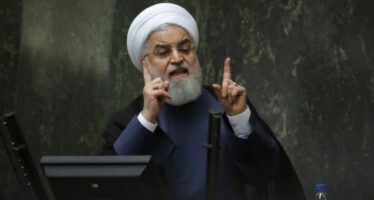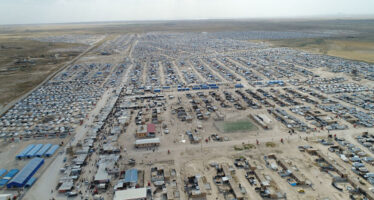PKK will eventually be player in solution
![]()
LALE KEMAL
Well-informed sources close to the government state that Ankara has adopted a new strategy under which negotiations with foreign key actors, including Iraqi Kurdish leaders, will be intensified in order to force the outlawed Kurdistan Workers’ Party (PKK) to lay down its arms and agree on a long-term unilateral cease-fire. Under the new strategy, the Turkish state has reportedly abandoned plans to resume a dialogue with the PKK to find a common ground for the organization to lay down its arms.
A Turkish official summarizes Turkey’s strategy as “weakening the PKK within the system where it was being fed.” By the term, “system,” the source refers to the key actors who have, for various reasons, knowingly or unknowingly, helped the PKK find room for maneuver to continue its violent attacks inside Turkey.
The PKK is an armed terrorist group that has been based in neighboring northern Iraq since the mid 1990s, using the region as a springboard to stage violent attacks inside Turkey.
The key players that Ankara believes can contain the PKK include the US, Iran, Iraqi Kurdish leaders and some European countries where PKK-linked groups have long been active, raising money for the organization. Some of the above-mentioned countries are not believed to be lending support to the PKK for its armed campaign, but their perception of a solution to Turkey’s terrorism problem does not necessarily coincide with that of Ankara’s. Some of these key players advocate for a political solution to be found on the PKK issue. And that perception prevents them from putting the necessary pressure on the organization in the absence of a determined stance in Ankara to put into force reforms that will ease Kurdish grievances.
Only in 2009 did Turkey make a paradigm shift in its Kurdish policy and declared a policy to find a non-military solution to the problem. State officials like Hakan Fidan, undersecretary of the National Intelligence Organization (M?T), conducted talks with PKK senior leaders including its head, Abdullah Öcalan, who is serving his life imprisonment at an island prison in Turkey. But talks were broken when the PKK stepped up its violent attacks against the Turkish targets inside the country in the middle of the summer.
The government, in return, has, at least for the time being, suspended its reformist approach and initiated a massive crackdown on the PKK. In addition, the government has re-initiated massive but controversial operations against the Kurdistan Communities Union (KCK), the urban wing of the PKK. Over 70 people, including 40 of Öcalan’s lawyers, were arrested in the latest wave of operations over charges of promoting violence.
Against this background, the government has appeared not to initiate any dialogue with the PKK. According to an informative source close to the government, Ankara no longer wishes to re-establish a dialogue with either Öcalan or with the PKK. Ankara is of the belief that Öcalan has not been influential enough over the group to stop some of its violent attacks against Turkish targets, but it accepts that Öcalan has enjoyed strong support from the country’s Kurdish population.
“The new process in the fight against the PKK has now concentrated on establishing a dialogue with key players who are believed to be influencing the PKK. The ultimate aim is to narrow the PKK’s room for maneuver as much as possible so that it can agree on a long-term ceasefire and laying down its arms,” says the same source.
Turkey already put into force the above-mentioned strategy when it started intense talks with both the US and Iran, as well as with Iraqi Kurdish leaders.
The popular uprisings in countries next to Turkey, namely the Middle East, and the US’ withdrawal from neighboring Iraq next month, have already made Turkey redesign, among other things, its policy on the PKK.
It is inevitable that a power vacuum will emerge in Iraq as a whole and in northern Iraq — where the PKK has bases — in particular, once the US withdraws its troops from the country. As stated by Turkish National Defense Minister ?smet Y?lmaz late last month while he was in Washington D.C., Ankara and Washington D.C. have been coordinating policies to prevent a power vacuum from emerging in Iraq.
The US’ transfer of four Predator unmanned aerial vehicles (UAVs) to Turkey’s ?ncirlik base this month stands among indications of the country’s continued support to Ankara to help NATO member Turkey continue monitoring PKK activities in northern Iraq after it withdraws.
In addition, Ankara expects the Iraqi Kurdish leaders to display openly that they are against the PKK’s existence on their territory so that the organization will feel the heat and know that it cannot act freely in the region anymore.
A strategy to end the PKK’s outside support is highly critical in curbing violence. But at the end of the day, Turkey should find a way to reach a compromise on addressing the Kurdish question inside the country. The PKK’s role at this stage cannot be denied.
Related Articles
Ready for nuclear talks if US lift sanctions, said Rouhani
![]()
Iran President Hassan Rouhani said on Wednesday that Iran is still ready for nuclear talks if the United States lifts “unlawful”
Erdo?an’s half victory
![]()
The Kurdish people have brought peace to the political agenda Prime Minister Recep Tayyip Erdo?an, choosing to speak from the
Autonomous Administration: Situation in Hol Camp concerns the whole world
![]()
The North and East Syria Autonomous Administration has issued a call to the international community to take their responsibility for




